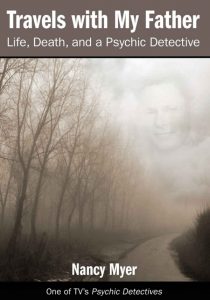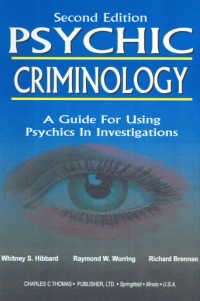Travels with My Father: Life, Death, and a Psychic Detective
Travels with My Father: Life, Death, and a Psychic Detective, by Nancy Myer, was published in 2013 by GoodKnight Books, Imprint of Paladin Communications, Pittsburgh, Pennsylvania.
“Life is full of wonderful mysteries that no one understands, one in particular being what happens after death,” writes Nancy Myer (formerly Nancy Czetli) in the Prologue of her book. “I help to locate missing wills – and missing people’s bodies. Sometimes, this incredible help from the other side of death reveals murderers to me. This is how life unfolds for me. Through my job, my experiences, and the many accounts I’ve heard from others of loved ones reaching back across the divide, I have become certain that love survives death.”
An earlier 1993 book by Nancy Myer-Czetli and Steve Czetli, Silent Witness, details her experiences working with law enforcement as a psychic detective. In addition, the program and internet site, Unsolved Mysteries, disclose the fact that she had consulted with the police on more than 300 criminal cases. These and numerous other sources, including YouTube videos, leave little doubt about her psychic abilities. Travels with My Father is a more personal account of her life and the extraordinary, ongoing communications and direct guidance she has received from her father after his death. In the Prologue she writes that this should not come as a surprise to anyone any longer. “If you have experienced incredible visits from the other side, you are not alone. You and I and many others can celebrate this part of life with the joyful awareness that death does not stop love.”
Her father, Fredric Myer, died unexpectedly of a heart attack at the age of 54. He had been with the U.S. Foreign Service (USAID, founded by John F. Kennedy), and Nancy and her mother and sister travelled extensively with him to Brazil, Chile, Ecuador, Afghanistan and Lebanon. Later, her father became head of vocational agriculture for the State of Delaware.
In Chapter Four, regarding her father’s “ghostly visits,” which she experiences initially as coldness, she explains that the visits begin with his voice, “strong and clear right beside me.” Then she sees him as he appeared in life.
“Over there, thoughts are things,” he explains. “Where I am, what you create in your imagination you can make real… I wanted to seem real to you so that you wouldn’t be afraid of me.”
“We’re all linked by our love and the Light of Life,” he later says. “I know it must sound strange to you, but it is very real. I feel different from when I was alive on your plane, because I no longer have a body to deal with. That part of it is freeing. As I explained to you before, thoughts are things, and that concept would not work if I were still in a body. In this form – as light – I can be anywhere that I am needed, sometimes in more than one place at a time, just by thinking about it.”
“So, for you, mind travel is a reality?” she asks.
“What’s hardest to understand – at least I think it is – is that time is not linear. Everything exists together, at once. That mystery will take me a while to fully understand. Being in this light doesn’t automatically mean I know everything. I’m still learning on this plane, too. Sorry, I can’t explain better …” He slowly vanished.
And through the years her father continues with his appearances, teaching, guiding, and warning of imminent dangers. More »

